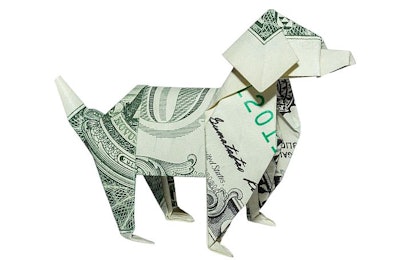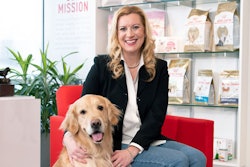
Following e-commerce pet food retailer Chewy’s initial public offering on the New York Stock Exchange, the stock increased from its original share price of US$22 to a high of US$41.34. Chewy’s stock price retreated a bit and opened on Monday at US$34.72, or nearly 60% higher than the IPO price.
Online pet food retailer Chewy raised approximately US$1 billion in the IPO, CNN reported. PetSmart purchased Chewy in 2017 for approximately US$3.4 billion and remains the majority owner with a 70% stake in the company and 77% controlling interest.
Chewy initial public offering history
On June 14, Chewy made 46,500,000 shares of its Class A common stock available at a price to the public of US$22.00 per share. The offering consists of 5,600,000 shares of Class A common stock being sold by Chewy and 40,900,000 shares of Class A common stock being sold by a wholly-owned subsidiary of PetSmart.
In addition, the PetSmart granted the underwriters a 30-day option to purchase up to 6,975,000 additional shares of Class A common stock at the public offering price, less underwriting discounts and commissions. Chewy will not receive any proceeds from any sale of shares.
A registration statement relating to this offering was declared effective by the Securities and Exchange Commission on June 13, 2019.
History of PetSmart and Chewy online pet food retailer
In 2017, PetSmart purchased Chewy. Following the acquisition, several pet food brands stopped selling their products on Chewy. For example, Tuffy’s Pet Foods executives decided to stop offering their products on the website.
“While we have respect for the success and growth witnessed by the large and mass retailers they do not fall within the channels we choose to support with our product and marketing plans,” said Tuffy’s executives in the press release. “It is our strong intent to continue with our current marketing plan focused on the independent specialty retailers and family owned businesses.”
In April, Chewy selected Salisbury, North Carolina for its new fulfillment center that will serve the Southeastern United States, announced the North Carolina Department of Commerce. The facility will create 1,200 new jobs and result in a US$55 million investment by Chewy in Rowan County.
Influence of Chewy on pet food industry
Chewy plays a large role in the rise of retail sales of dog and cat food in 2018, which rose approximately 4.3 percent over 2017’s total to reach US$27.15 billion in the United States, wrote Packaged Facts analysts in "Pet Food in the US, 14thEdition.” Online sales of pet food served as a major driver for overall industry growth in 2018. However, e-commerce continued to chip away at brick-and-mortar retailers’ share of the market, and now threatens established brands with private label pet foods from Amazon and Chewy.
Private label pet foods from Amazon and Chewy threaten established brands by leveraging their online sales platform to boost visibility, wrote Gartner L2 analysts in the report “Digital IQ Index: Pet Care U.S. 2018.” As more pet owners look to purchase pet food over the internet, online retailers increasingly have opportunities to boost exposure of their own brands by featuring those dog and cat foods in sponsored advertisements, on homepage displays and through other means. The ability of online retailers to undercut premium pet foods with their own brands threatens the profitability of pet food premiumization, which currently drives pet food sales value growth while volume growth stagnates.

















